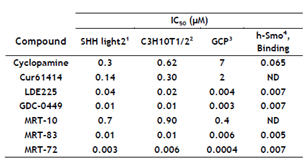Targeted drugs for brain cancer
Référence
01922-01; 02959-01; 04611-02
Mots-clés
Hedgehog driven tumors, Smoothened modulators, Antagonist, Drug resistance, Pediatric oncology
Statut des brevets
3 distinct patents families under priority of:
1) French patent application n° FR 08/02302 filed in April 24th, 2008 and entitled “N-Acylthiourea and N-acylurea inhibitors of the Hedgehog protein signaling pathway”




2) French patent application n° FR 09/03654 filed in July 24th, 2009 and entitled “Acylguanidine derivatives modulating the Hedgehog protein signaling pathway”




3) Priority patent application n° FR 11/58519 filed in September 23rd, 2011 and entitled “Nouveaux composés modulateurs de la voie de signalisation des proétines Hedgehog, leurs formes marquées et applications”








Inventeurs
Martial RUAT
Statut commercial
Exclusive license
Laboratoire
Neurobiology and Development Laboratory (UPR3294), CNRS, in Gif-sur-Yvette (Paris), France.
Description
CONTEXT
Medulloblastoma is a tumor of neuroectodermal origin occurring mainly in childhood. A subtype of pediatric medulloblastoma tumors is characterized by activated hedgehog (Hh) pathway, a pathway involved in the embryonic growth and development of organs. Ongoing clinical studies of inhibitors of Smoothened (Smo), a key receptor mediating the Hh pathway, have shown promising activity in Hh activated basal cell carcinoma and medulloblastoma. Nevertheless, as for most anticancer agents, resistance mechanisms have been reported in animal models of Hh-driven tumors and in a patient with medulloblastoma metastasis treated with a single agent (GDC-0449, Genentech) due to an acquired Smo mutation disrupting the ability of GDC-0449 to bind Smo.
TECHNICAL DESCRIPTION
To allow the development of new Smo inhibitors, we have delineated a pharmacophore based on the structure of reference Smo antagonists. Then, we have selected a collection of compounds obtained from in silico screening of a virtual library (500,000 commercially available « drug-like » molecules) based on the design of this pharmacophore and identified 20 chemically unrelated ligands that we have ordered and tested in several Hh assays. Among them, we have identified a new lead called MRT-10 [1]. By structure-activity relationship, we have synthesized and characterized MRT-83 and MRT-72 that belong to novel families of molecules with original chemical structures that have been patented.
[1] Manetti, F., Faure, H., Roudaut, H., Gorojankina, T., Traiffort, E., Schoenfelder, A., Mann, A., Solinas, A., Taddei, M., and Ruat, M., (2010) Virtual screening-based discovery and mechanistic characterization of the acylthiourea MRT-10 family as smoothened antagonists. Mol Pharmacol. 78(4): p. 658-65.
[2] Solinas, A., Faure, H., Roudaut, H., Traiffort, E., Schoenfelder, A., Mann, A., Manetti, F., Taddei, M., and Ruat, M., (2012) Acylthiourea, Acylurea and Acylguanidine Derivatives with potent Hedgehog inhibiting Activity. J Med Chem. 55(4): p. 1559-1571.
BENEFITS
- Well identified target ;
- Already identified and characterized proprietary leads acting on Smoothened and its GDC-0449 resistant mutant ;
- MRT-83 AND MRT-72 are among the more potent Smoothened antagonists reported so far and are easy to synthesize ;
- Developing second generation of Smo inhibitors for pediatric brain tumors ;
- MRT compounds may also be of interest for treating other Hedgehog linked cancers.
INDUSTRIAL APPLICATIONS
The compounds could be mainly used as a drug for the treatment of tumors associated with a hyperactivation of the Hh protein signaling pathway (medulloblastoma, glioblastoma, basal cell carcinoma, rhabdomyosarcoma, pancreatic cancer etc.). Furthermore, in addition to cancer, these compounds can find applications for the treatment of a large number of diseases, notably diseases in which a blockage of the Hedgehog signaling pathway could be beneficial, such as diabetes.
DEVELOPMENT STAGE
Specificity and potency:
MRT-83 does not display antagonist activity towards the Wnt signalling pathway [1] and towards a panel of kinases, GPCR and transporters (unpublished data, primary screen done at CEREP).
MRT-83 and MRT-72 block the binding of Bodipy-Cyclopamine to rodent and human Smo (Table 1). MRT-83 displays a similar potency compared to GDC-0449 and LDE225 whereas MRT-72 is the most potent Smo antagonist described so far (Table 1). We have developed a tritiated form ([3H]MRT-72) which can be used as a selective and potent Smo radioligand.

Table 1. Comparison of Smo antagonists’ potency in different pharmacological assays. 1) Inhibition of the activity induced by 5 nM SHH (Biogen Idec) in SHH-light2 cells expressing the Gli1-dependent firefly luciferase. 2) Inhibition of the differentiation of C3H10T1/2 cells induced by 0.1μM SAG monitored by alkaline phosphatase (AP) activity. 3) Inhibition of SAG (0.01μM) induced rat granular cell precursor proliferation. 4) Inhibition of Bodipy-Cyclopamine binding (5 nM) to human Smo transfected in HEK293 cells. ND: Not Determined. IC50 are from 3 to 5 independent experiments.
Back up MRT molecules:
Interestingly, we have shown that the guanidine MRT-83 can be synthesized by the transformation of a thiourea or a urea function [2]. We have shown that the thiourea and urea analogs of MRT-83 are also very potent antagonists of Smo [2]. They represent back up analogs in our studies.
Thus, we have synthesized and characterized MRT Smo antagonists that are among the most potent Smo antagonists known so far. At our knowledge, we are the first academic groups in Europe and at an international level to have proprietary Smo antagonists displaying subnanomolar potency. The emergence of resistance to Smo inhibitors has been only documented in one patient with medulloblastoma, the potential emergence of resistance has to be monitored more carefully in the ongoing clinical trials of Smo inhibitors in medulloblastoma, BCC and in other cancer. Therefore, evaluating the effects of MRT-83, MRT-72 and their backup analogs in mouse model of Hh driven medulloblastoma is of major interest.
For further information, please contact us (Ref 01922-01 / 02959-01 / 04611-02)
Besoin de plus d'informations ?
Nous contacterTechnologies Liées
-
31.03.2015
Protein involved in DNA replication, and modulation of its activity
Santé / Thérapeutique, Diagnostic médical 06081-01
-
10.03.2014
Protein complex mcm8/mcm9, inhibitors thereof, and their use for enhancing or reducing animal fertility
Santé / Thérapeutique, Autres technologies 00017-04
-
03.03.2014
Chimeric molecule involving oligomerized FasL extracellular domain
Santé / Thérapeutique 03946-01